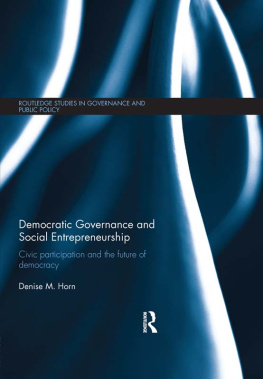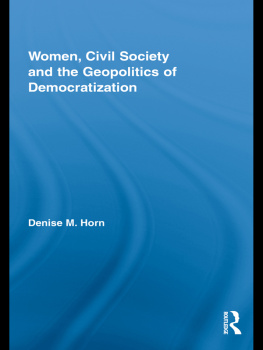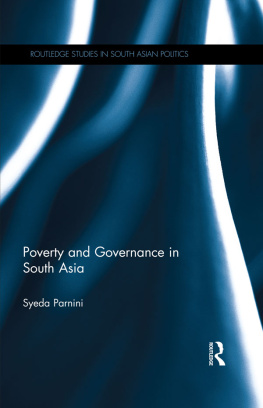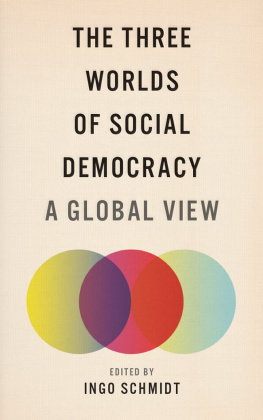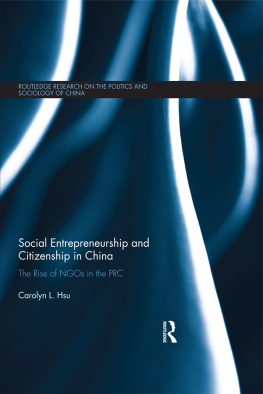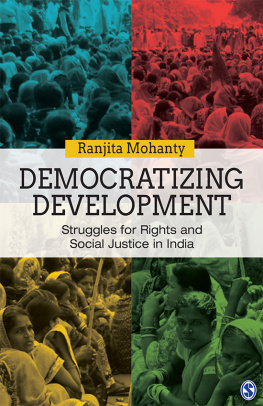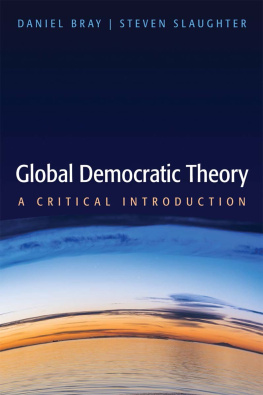Democratic Governance and Social Entrepreneurship
This book explores the connection between strong democracy and neoliberal development schemes based on the concept of social entrepreneurship in Thailand and Southern India.
With an original approach, this book addresses the intersection between emerging approaches to development; namely microfinance, microenterprise, and social entrepreneurship, and the ability of societies to generate their own public goods without state assistance. Utilizing observation, fieldwork, and practice in Northern Thailand and Southern India, as well as secondary sources from the southern Asia region more generally, the author examines the challenges of democratic governance and generation of public goods where civil society and democracy, as development strategies, have become less meaningful to citizens across the developing world than microdevelopment. The author argues that these approaches to development have impacts on development and civil society building, but do not necessarily amount to political empowerment, raising important questions for civic participation in the state when the state is no longer viewed as the locus of public goods and democratic governance.
Presenting a new theoretical approach to understanding the changing paradigm of development and political participation, Democratic Governance and Social Entrepreneurship will be of interest to students and scholars of development politics, political economy and governance.
Denise M. Horn is an Assistant Professor of International Affairs and Political Science at Northeastern University in Boston, USA.
Routledge studies in governance and public policy
Public Sector Ethics
Finding and implementing values
Edited by Charles Sampford and Noel Preston with Carol-Anne Bois
Ethics and Political Practice
Perspectives on legislative ethics
Edited by Noel Preston and Charles Sampford with Carol-Anne Bois
Why Does Policy Change?
Lessons from British Transport Policy 194599
Jeremy Richardson and Geoffrey Dudley
Social Relations and Social Exclusion
Rethinking political economy
Peter Somerville
Local Partnerships and Social Exclusion in the European Union
New forms of local social governance?
Edited by Mike Geddes and John Benington
Local Governance in England and France
Alistair Cole and Peter John
Politicization of the Civil Service in Comparative Perspective
The quest for control
Edited by B. Guy Peters and Jon Pierre
Urban Governance and Democracy
Leadership and community involvement
Edited by Michael Haus, Hubert Heinelt and Murray Stewart
Legitimacy and Urban Governance
A cross-national comparative study
Edited by Hubert Heinelt, David Sweeting and Panagiotis Getimis
The Idea of Public Service
Reflections on the higher civil service in Britain
Barry O'Toole
Changing Images of Civil Society
From protest to government
Edited by Bruno Jobert and Beate Kohler-Koch
Reasserting the Public in Public Services
New public management reforms
Edited by M. Ramesh, Eduardo Araral and Xun Wu
Governing Modern Societies
Towards participatory governance
Hubert Heinelt
Understanding the Politics of Pandemic Scares
An introduction to global politosomatics
Mika Aaltola
Accountability in Crises and Public Trust in Governing
Institutions
Lina Svedin
Democratic Governance and Social Entrepreneurship
Civic participation and the future of democracy
Denise M. Horn
Democratic Governance and Social Entrepreneurship
Civic participation and the future of democracy
Denise M. Horn
First published 2013
by Routledge
2 Park Square, Milton Park, Abingdon, Oxon, OX14 4RN
Simultaneously published in the USA and Canada
by Routledge
711 Third Avenue, New York, NY 10017
Routledge is an imprint of the Taylor & Francis Group, an informa business
2013 Denise M. Horn
The right of Denise M. Horn to be identified as author of this work has been asserted in accordance with sections 77 and 78 of the Copyright, Designs and Patents Act 1988.
All rights reserved. No part of this book may be reprinted or reproduced or utilized in any form or by any electronic, mechanical, or other means, now known or hereafter invented, including photocopying and recording, or in any information storage or retrieval system, without permission in writing from the publishers.
Trademark notice: Product or corporate names may be trademarks or registered trademarks, and are used only for identification and explanation without intent to infringe.
British Library Cataloguing in Publication Data
A catalogue record for this book is available from the British Library
Library of Congress Cataloging-in-Publication Data
Horn, Denise M. (Denise Marie)
Democratic governance and social entrepreneurship : civic
participation and the future of democracy / Denise M. Horn.
p. cm. (Routledge studies in governance and public policy;
v. 16)
Includes bibliographical references and index.
1. MicrofinanceThailand, Northern. 2. Microfinance
IndiaAndhra Pradesh. 3. Political participationThailand,
Northern. 4. Political participationIndiaAndhra Pradesh.
5. Social entrepreneurshipThailand, Northern. 6. Social
entrepreneurshipIndiaAndhra Pradesh. I. Title.
HG178.33.T5H67 2013
338.04dc23
2012032853
ISBN: 978-0-415-66893-4 (hbk)
ISBN: 978-0-203-59785-9 (ebk)
Typeset in Sabon
by Wearset Ltd, Boldon, Tyne and Wear
For the students who inspire me to think, work and act
Contents
PART I
Agency, structure, and democratization
PART II
Social entrepreneurship, the state, and governance
Preface
This book began with very different intentions. Like many others who have worked in or studied the NGO sector, I was in search of solutions to the world's most intractable problems. Democracy has long been promoted as the panacea for the world's social, political and, with the advent of the Washington Consensuseconomic ills. As a graduate student studying civil society and democratization in the Newly Independent States of the former Soviet Union in the early 2000s, I realized that democratization doesn't happen in a vacuum. Other conditions must be met: education, women's rights, the adoption of liberal norms, and improving economies. It was easier in some places than others: in Estonia, a strong civil society already existed, providing a sense of unity which reclaimed its proud legacy of leadership in the Hanseatic Leaguebut still, hundreds of young Estonian women were finding themselves in the international sex trade. Moldova faced a worse situation with similar results: the internal politics of language, ethnicity, and poverty were sending thousands abroad every year in search of work; this meant brothels, the sex trade, manual labor, and domestic work.
The NGOs I was studying were based upon a model of civil society that had been promulgated by the West, which encouraged the growth of the NGO sector to cure society's ills. Increasingly, however, many of the NGOs that sprouted like mushrooms at this time were more likely in search of funding rather than doing the real work of building civil society and thriving democracies. Words like empowerment, women's rights, democracy, and democratization popped up in every grant proposal, but the rhetoric was often empty in light of the political or social realities many NGOs faced. Hundreds of thousands of dollars were spent on projects that produced results, which were often a conference, a booklet or perhaps a campaign. As I outlined in my first book,

